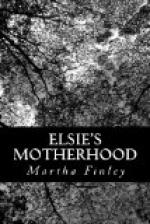But presently catching sight of the still smoking embers of the Ion school-house, he drew rein for an instant with a sudden exclamation of surprise and regret. “The wretches, what will they do next? burn our houses about our ears?” and sighing, he pursued his way.
Indignant anger, and tender pity and compassion filled his breast by turns, on reaching the quarter and discovering the state of things there; worse even than Park’s report had made it.
He rode from cabin to cabin inquiring into the condition of the inmates and speaking words of pity and of hope.
Finding several badly bruised and cut, and others suffering from gunshot wounds, he sent to the house for lint, salve and bandages, and directed a lad to run to the stables, saddle a horse; and go immediately for Dr. Barton.
“De doctah ober to Ion now, sah,” returned the boy, “debbils dore las’ night, too, sah.”
“Run over to Ion, then, and ask the doctor to come here when he is through there,” said Mr. Leland.
Mr. Travilla came with the doctor and the two planters compared notes, in regard to damages, Mr. Leland also telling the story of the coffin laid at his door.
“What do you intend doing?” asked Mr. Travilla.
“Inclination says, ‘Stay and brave it out;’ but I have not yet fully decided. I have invested all my means in this enterprise, and have a wife and family of helpless little ones to support.”
“That makes it hard indeed; yet I fear your life is in great danger. But come what may, Leland, I stand your friend. If you should be attacked, fly to Ion; you will find an open door, a hearty welcome, and such protection as I am able to give. I think we could conceal you so that it would be a matter of difficulty for your foes to find you.”
“A thousand thanks! God bless you for your kindness, sir!” exclaimed Leland, with emotion, warmly grasping the hand held out to him; and the two parted, each wending his homeward way.
Chapter Thirteenth.
“Humble love,
And not proud reason, keeps the door of heaven;
Love finds admission, where proud science fails.”
—Young
Elsie was on the veranda looking for her husband’s return to breakfast; for it was already past the usual hour.
“All alone, little wife?” he asked as he dismounted and came up the steps.
“Not now,” she answered, putting her arms about his neck and looking up at him with her own fond, beautiful smile. “But your face is sad, my husband! What news?”
“Sad enough, my little friend; poor old Uncle Mose has been so barbarously handled that he cannot live through the day, Dr. Barton says: and two of the others are suffering very much.”
Elsie’s eyes were full. “Does Uncle Mose know it?” she asked.
“Yes, I told him, as tenderly as I could, and asked if he was ready to go. ‘Yes, Mars Edard,’ he said, with a triumphant smile, ’for I’se got fast hold ob Jesus.’”




